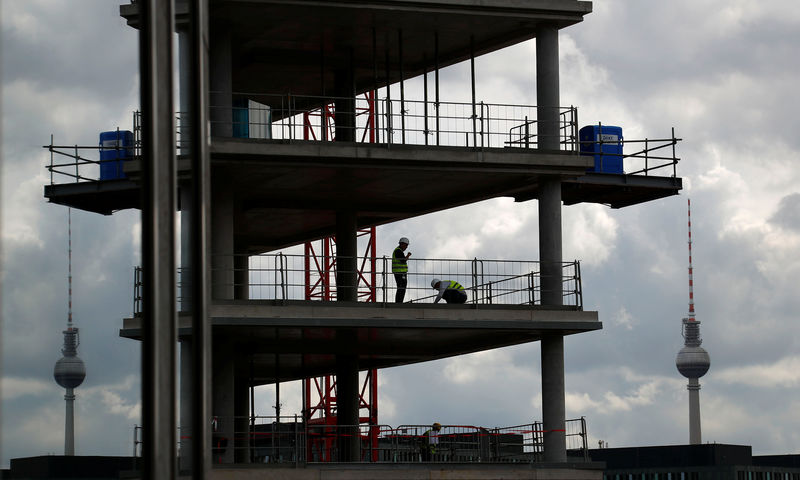By Paul Carrel and Rene Wagner
BERLIN (Reuters) - Germany's economy contracted for the first time since 2015 in the third quarter as global trade disputes and problems in the auto industry put the traditional growth engine of exports into reverse, raising concerns that a long expansion is faltering.
Gross domestic product (GDP) in Europe's biggest economy fell 0.2 percent quarter-on-quarter, the Federal Statistics Office said on Wednesday. That compared with a Reuters forecast of a 0.1 percent drop.
But the Economy Ministry said the upswing would resume in the fourth quarter, adding that the slowdown between July and September had been a temporary phenomenon as car companies struggled to adjust to new pollution standards known as WLTP.
"A 0.2 percent contraction isn't a catastrophe," Economy Minister Peter Altmaier said in Berlin.
Compared with the same quarter of the previous year, the economy grew 1.1 percent in the third quarter, calendar-adjusted data showed. Analysts polled by Reuters had expected 1.3 percent.
"The slight decline in GDP compared to the previous quarter was mainly due to foreign trade developments: provisional calculations show there were fewer exports but more imports in the third quarter than in the second," the Office said.
Separately, Germany's BDI industry association cut its 2018 export growth forecast to 3 percent from 3.5 percent on Wednesday, the second cut in as many months.
The third-quarter dip in GDP was the first time the economy has contracted since the first quarter of 2015.
The government had flagged a weaker third quarter last month, citing bottlenecks in the car sector stemming from the introduction of WLTP as a factor.
"Germany doesn't have an economic problem but rather an auto sector problem. Due to the sluggish certification of cars, car production had to be noticeably reduced, with collateral damage for other sectors too," said Andreas Scheuerle at DekaBank.
The Economy Ministry said problems adapting to the WLTP had probably shaved up to 0.4 percentage points off third quarter GDP.
"The upturn was merely disrupted during the third quarter," the ministry said in its monthly report, adding: "Once these special effects have dissipated, the German economy's upturn will continue."
However, the ZEW research institute said on Tuesday that investors do not expect the German economy to recover rapidly from the weak patch.
Concerns are growing in the German economy, which is in its ninth year of expansion, about the impact of global trade disputes and Britain's departure from the European Union.
In addition to anxiety about the impact of U.S. President Donald Trump's abrasive trade policy, German firms are concerned about instability at home where Chancellor Angela Merkel's awkward 'grand coalition' has come close to collapsing twice.
Carsten Brzeski, an economist at ING, said that even though he expected the auto sector to rebound in the fourth quarter, the GDP figures period were a "wake-up call that political stability and strong growth are by no means a given".
"The poor export performance, despite a weak euro exchange rate, suggests that trade tensions and weaknesses in emerging markets could continue to weigh on Germany's growth performance," he said in a research note.

Last month, Germany's DIHK Chambers of Industry and Commerce cut its 2018 growth forecast to 1.8 percent from 2.2 percent and predicted a slowdown to 1.7 percent next year as the economy faces growing risks at home and abroad.